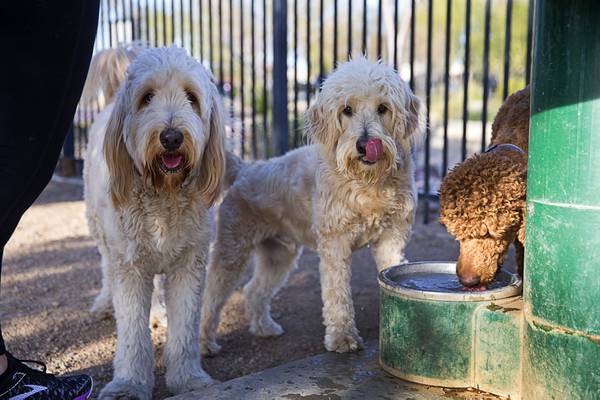Related Content
Not a day goes by without Dr. Christopher Yach, a veterinarian at the West Flamingo Pet Clinic, being asked about COVID-19 and pets. Initially, when the pandemic forced business closures in mid-March, those questions came from every pet owner who visited the hospital, and from dozens of nonstop, daily calls to the office.
Like most of the world in learning about the pandemic, owners were frantic. They wanted to know if their beloved animals were at risk of catching the coronavirus and dying. They also wondered if animals could be carriers of the virus and transmit it to humans.
“There’s not a high risk for pets whatsoever,” said Yach, the hospital’s owner and director. “There’s been a handful of positive animals, yes. But we are talking 1/100th of a percent.”
One of those rare instances was reported in April out of Staten Island, N.Y., where a 7-year-old German shepherd tested positive for COVID-19. The dog was laboring while breathing and its owner was also positive for the virus. The dog eventually recovered, but last month died because of a preexisting lymphoma condition, according to National Geographic.
“You tell people that your dog was positive, and they look at you (as if you have) 10 heads,” Allison Mahoney, one of dog’s owners, told National Geographic.
In Hong Kong, a 17-year-old Pomeranian whose owner had the virus also tested positive in late February, according to Live Science. The animal didn’t have symptoms and was allowed to return home after being quarantined. The dog died a few weeks later.
You could argue the virus was a factor in each dog’s death. But, then again, one animal had a form of cancer, and the other was 17. There was no autopsy performed.
Yach presents a scenario where there’s a cat sitting in the lap of an owner who has the virus, either knowingly or unknowingly. Could that cat then take the virus to a neighboring house when it wanders around the neighborhood?
“The answer is I don’t know,” he said. “There’s just not enough information. But there certainly isn’t a high risk for that. There’s a million cases of the virus worldwide, and nobody has reported a case of that happening.”
The Centers for Disease Control and Prevention in late June reported that only a few pets have been confirmed to be infected with the virus. Those pets only had mild symptoms and were able to be cared for at home. And, most important, none died.
“Based on the limited information available to date, the risk of animals spreading COVID-19 to people is considered to be low,” the CDC said in its report.
Still, the CDC instructs to isolate pets showing signs of the virus and to immediately call a veterinarian. They also say to eliminate walks, visits to the park and allowing the animals to share beddings — with other animals or humans. Also, disinfect toys.
But, they stress, in bold face type, that “there is no reason to abandon or surrender pets that have been confirmed positive for the virus that causes COVID-19.”
Hospitals such as the West Flamingo Pet Clinic have become overly cautious in how their office is set up.
Instead of a waiting room full of pets, owners and their animals wait outside until it’s their turn to be seen. After each pet visit, the exam room and table is thoroughly disinfected, Yach said. If owners are COVID-19 positive, they are ordered to stay away.
“We don’t even use the lobby anymore,” Yach said.
Owners should wear a mask and gloves when visiting the office. But dogs shouldn’t wear a mask. Also, the CDC instructs owners to not bathe pets in “chemical disinfectants, alcohol, hydrogen peroxide or other products not intended or approved for use on animals.”
“There is no evidence that viruses, including the virus that causes COVID-19, can spread to people or other animals from the skin, fur or hair of pets,” according to the CDC.
Like everything with coronavirus, Yach and the CDC stress that experts are still learning about the disease and the information is constantly evolving. But what’s been constant is the risk of animals dying from the virus, they say.
“Just use common sense and be safe,” Yach says about caring for pets.

